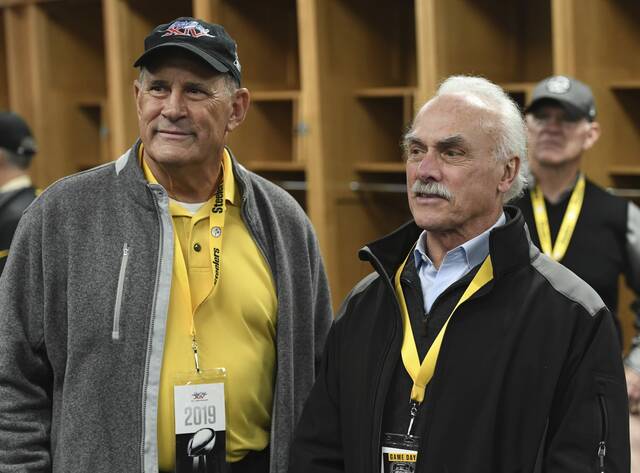With the Steelers unpredictably making it to the playoffs and being a long shot in going further, it’s a good time to reflect on another fortuitous long shot in the team’s past.
You won’t see Rocky Bleier’s name associated with many individual records, but he was a key part of the Steelers’ rise to greatness in the 1970s. He was like a Swiss Army knife, called upon to do many things — play on special teams, be the lead blocker for Franco Harris (along with being a major running back himself) and be a key receiver out of the backfield for Terry Bradshaw.
During Rocky’s career with the Steelers, the team won four Super Bowls, with Rocky catching a touchdown pass in Super Bowl XIII against the Dallas Cowboys.
Before there was Rudy Ruettiger at Notre Dame, there was Rocky Bleier. Notre Dame won the national championship in his junior year in 1966. He was a gritty and determined halfback and, despite his small size, he excelled, leading the Pittsburgh Steelers to draft him in the 16th round in 1968.
Later that year, after his first season with the Steelers, Rocky was drafted again — this time by Uncle Sam. Rather than seek a deferment or a position in the reserves, which many athletes did at the time, Rocky accepted his duty and served in Vietnam at the height of the war.
In August 1969, Rocky was seriously wounded when a grenade blew up near him, damaging his right leg and costing him part of his right foot. Doctors told him he would never be able to play football again.
A running back’s feet are essential to his speed, ability to make cuts and block. Being able to come back and play at the elite level demanded in the NFL after such an injury seemed impossible.
While he was recovering in a hospital bed in Tokyo, Rocky received an unexpected but welcome note: A 5-cent postcard with the simple handwritten message, “Rock — The team’s not doing well. We need you.” It was signed by Steelers owner Art Rooney.
It’s not certain that Rooney believed Rocky could ever play again. The odds were not good, based on his injuries and his time away from the game. Younger, faster players had replaced him on the roster, and there was always the draft or a possible trade for a good running back.
Rooney, though, cared about people and loved everything about Pittsburgh. He was a strong family man, and the Steelers players were part of his extended family. Former players who found themselves in difficult straits could count on Rooney for help. His concern for his players’ welfare was well known and made him one of the most beloved owners in the NFL.
Rooney’s note let Rocky know that he was still part of the “family.” He placed the ball in Rocky’s court as he recovered and built himself back to pro football form. He would be given the chance to come back, but would need to prove that he belonged.
In 1970, after a lengthy recuperation, Rocky was discharged from the Army with a 40% disability but continued with his dream of once again playing professional football. When he was cut by the Steelers in 1970, Rooney intervened and instead had Rocky placed on the injured reserve list so he could still receive a salary while rehabbing.
In 1971, Rocky went to training camp and was placed on waivers by the Steelers, with no team picking him up. He pushed on and finally, in 1972, Rocky secured a roster slot as a special teams player for the Steelers. It would be 1974 before he would come into his own, joining Harris and Bradshaw in one of the greatest backfields in NFL history.
It’s not always the big things in life that make a real difference; sometimes it’s the simplest and smallest of gestures. One wonders whether Rocky Bleier would have had the will and drive to come back and play professional football if he had not received that 5-cent postcard.
Greg Fulton is a New Castle native living in Denver.








